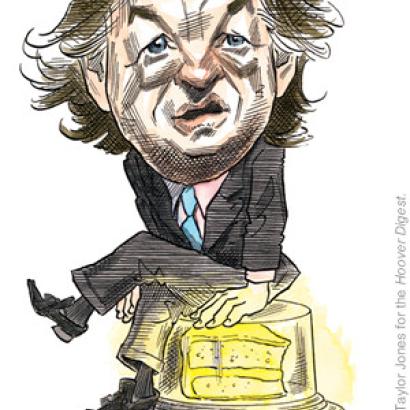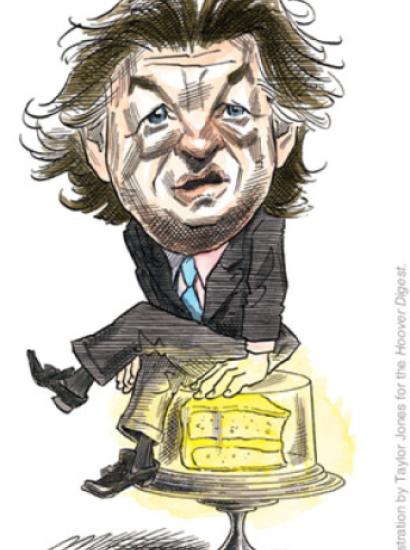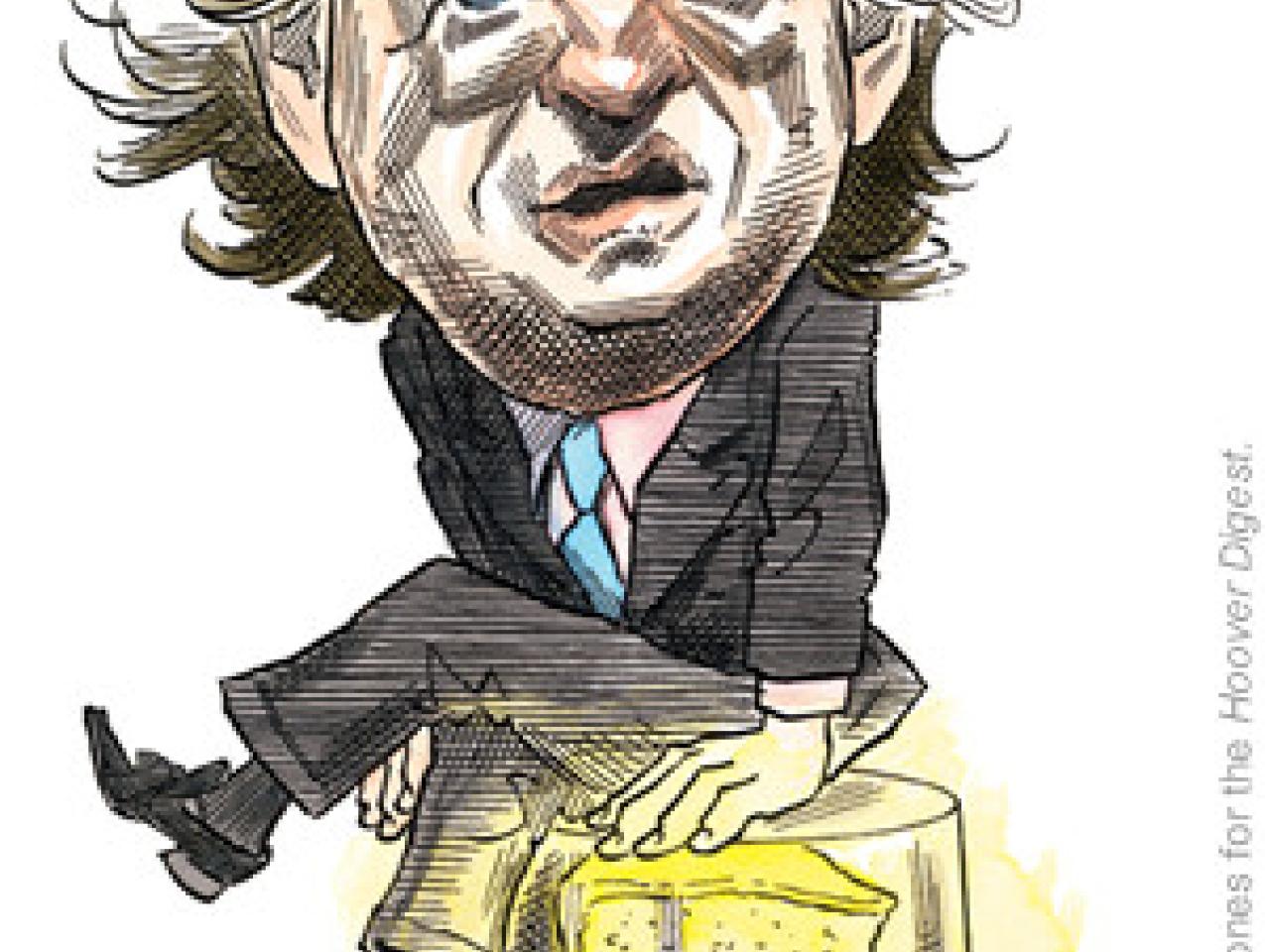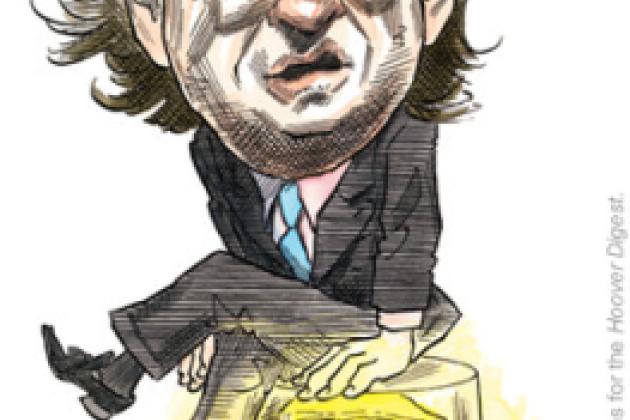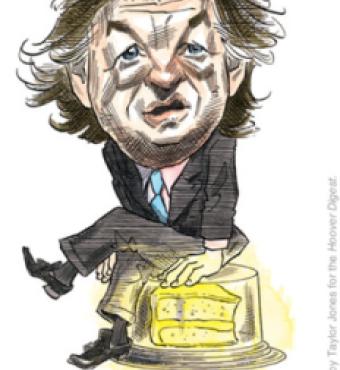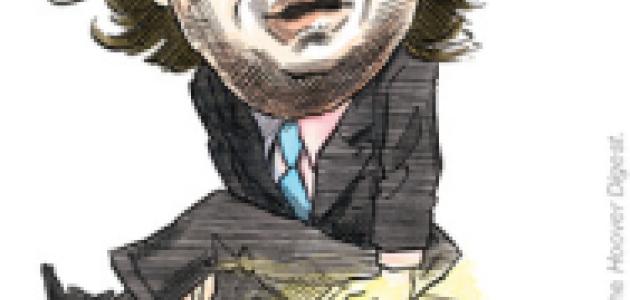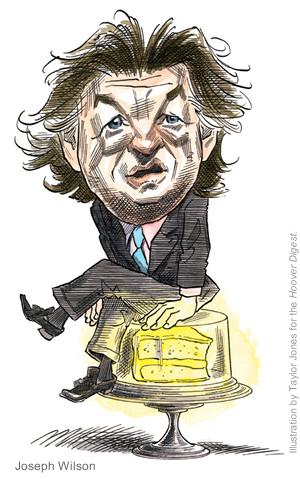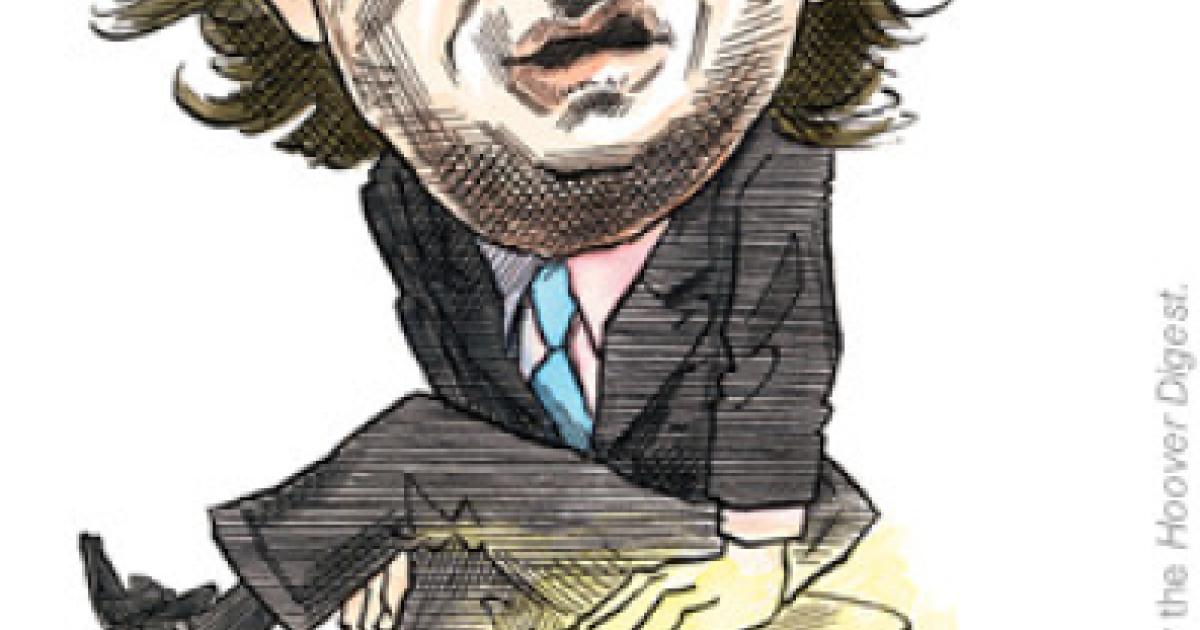- Law & Policy
- Campaigns & Elections
- The Presidency
- Politics, Institutions, and Public Opinion
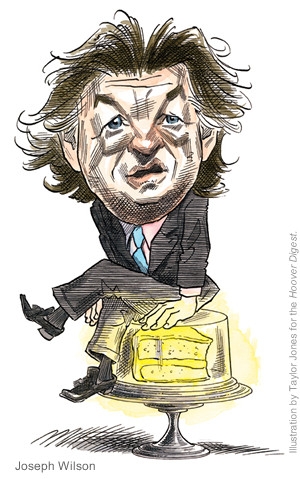
A Rhode Island investigative reporter and a fibbing former ambassador have combined to trigger a new round of debate over the extent to which the First Amendment should restrict the government’s right to compel the disclosure of a journalist’s source. Most previous cases have hinged on the important evidence a secret source was believed to possess, but in these two situations the source of the leak is itself the only relevant issue.
In the Rhode Island case, the defendants, headlined by former Providence mayor Vincent “Buddy” Cianci, have long since been convicted and sent to jail. Except for the effort of the court to find out who provided WJAR-TV reporter Jim Taricani with hidden camera footage of one of the defendants accepting a payoff, the case is effectively closed. Taricani himself might well have been jailed for contempt by now had a heart transplant some years ago not raised concerns about the impact incarceration might have on his health.
The case of the fibbing ambassador, Joseph Wilson, and his wife, Valerie Plame, a covert CIA agent specializing in weapons of mass destruction (WMDs), has received far more national attention and has already led to the appointment of a special counsel and a 70-minute interrogation of President Bush.
A “Festival of Hypocrisy”
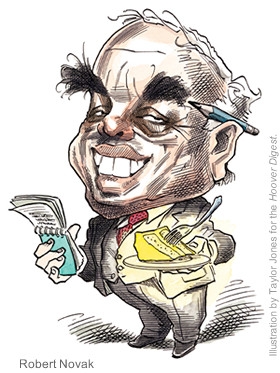
Wilson had been the chargé d’affaires in Baghdad in 1990 and an ambassador to two African countries before joining President Clinton’s National Security Council as a senior specialist on Africa. In February 2002 the CIA asked him to travel to Niger to determine the extent and results of Saddam Hussein’s efforts to purchase Yellowcake uranium. The choice of Wilson was curious, not only because of his close ties to the Clinton administration but also because, after leaving government, he had contributed to the 2000 campaign of Al Gore.
After eight days in the area Wilson reported orally to the CIA that he had found no hard evidence of any sale of Yellowcake to Iraq. But former Nigerian prime minister Ibrahim Miyaki told him that an Iraqi trade delegation had visited Niger in 1999. Because Yellowcake sales amount to 60 percent of Niger’s export revenue, both Miyaki and Wilson concluded the Iraqis had been trying to buy uranium. The CIA treated Wilson’s information as confirmation of efforts by Saddam Hussein to purchase material essential for a nuclear program. British intelligence later reached a similar conclusion, and in his 2003 State of the Union Address mobilizing support for the coming war against Iraq, President Bush famously declared, “The British government has learned that Saddam Hussein recently sought significant quantities of uranium from Africa.”
Although the president’s statement was consistent with both British intelligence and Wilson’s own oral report, the former ambassador went public in spectacular fashion, publishing an op-ed piece in the New York Times on July 6 and appearing on NBC’s Meet the Press the same day, strongly suggesting that his information ran contrary to the president’s words. In the Times he charged that “if the information was ignored because it did not fit certain preconceptions about Iraq, then a legitimate argument can be made that we went to war under false pretenses.” One can only imagine the fury at the Bush White House over what it perceived as a blatant act of political treachery. Wilson, sent on a sensitive information-gathering mission, had manufactured a conflict of fact where none existed and then offered the conflict as proof that the president had misled the nation into war.
On July 14, conservative columnist Robert Novak devoted a column to Wilson, motivated by the obvious question of why a Clinton-Gore loyalist had been sent on so sensitive a mission. When Novak raised the issue during a long conversation with “a senior administration official,” he was told that “Wilson had been sent by the CIA’s counter-proliferation section at the suggestion of one of its employees, his wife.” Novak later described the remark as “an offhand revelation from this official, who is no partisan gunslinger.” When Novak called the CIA for confirmation, an official requested that Wilson’s wife’s name not be used and suggested that, although she was unlikely to receive another foreign assignment, exposing her name might cause her “difficulties” if she traveled abroad.
Novak’s column provoked instant fury in the liberal community. Wilson accused the Bush White House of seeking crude retribution by “outing” his wife. Then he fanned these flames, alleging that Bush political adviser Karl Rove had orchestrated the assault. Others speculated that the culprit was I. Lewis “Scooter” Libby, a senior aide to Vice President Cheney. The Bush people, it was said, had peddled the story to six unwilling scribes before the accommodating Novak agreed to run the information. Soon Wilson was out in hardback with The Politics of Truth, in which he proclaimed that his wife had been sacrificed for no reason: “Valerie had nothing to do with the matter.” Wilson also told Walter Pincus, a Washington Post reporter, that at the time of his trip he knew that any suggestion of a sale of Yellowcake by Niger to Iraq was false, as “the dates were wrong and the names were wrong.”
Wilson later told the Senate Intelligence Committee that he had “misspoken” to the Post, as the forgeries were not known at the time of his trip. The committee had also unearthed a Valerie Plame memo recommending her husband for the Niger assignment because “my husband has good
relations with the former Minister of Mines (not to mention lots of French contacts), both of whom could possibly shed light on this sort of activity.”
But long before Wilson’s credibility was shattered, the hunt for Novak’s source had taken on vast new dimensions. Under the Intelligence Identities Protection Act of 1982, it is a felony for a person with access to classified information to deliberately disclose the identity of a covert agent. (Reporters are exempt from the law unless they engage in “a pattern of” naming agents with the intent to undermine intelligence activities.) Members of the liberal press like the Nation, never at the epicenter of support for covert intelligence operations, now worried that the political score-settlers at the White House would impede Plame’s “dicey and difficult mission” of learning about WMDs. Senator Diane Feinstein took the floor to declare that “for [Plame] to be essentially ‘outed’ by the administration can put every CIA agent in jeopardy.”
The president, unwilling to look “soft” on national security, invited the attorney general to investigate the source of the leak and reportedly instructed his staff to cooperate fully with the investigation. As the investigation matured, the attorney general handed it over to a special prosecutor, Patrick Fitzgerald, who convened a special grand jury and quickly subpoenaed the notes of two reporters, Tim Russert of NBC and Matthew Cooper of Time magazine. Both contested the subpoena; a third, Glenn Kessler of the Washington Post, submitted to an interview, after Libby and other White House staffers signed waivers to any confidentiality agreements reached with the press. Novak said he would go to jail before revealing his source.
In the absence of legal compulsion, it is considered at least a breach of journalistic ethics to violate a pledge of confidentiality with respect to accurate information, but there is also a legal obligation not to violate a pledge. In the 1991 case Cohen v. Cowles Media Company the Supreme Court held that a source who suffered harm through breach of a pledge of confidentiality was entitled to damages. Dan Cohen, a Minnesota GOP political operative, had been assured by two reporters that his identity would be protected if he provided information on the past legal difficulties—including three shoplifting arrests—of the Democratic candidate for lieutenant governor. Both newspapers reneged on the deal and ran Cohen’s name in their stories about sleazy last-minute leaks. Cohen lost his job, sued, and was rewarded with a substantial verdict.
Astonishingly, the lust for Bush administration blood in the Wilson affair was so strong in the liberal media that two of its premier members, former Washington Post ombudsman Geneva Overholser and Jonathan Alter of Newsweek, urged Novak, or others who had received the leak, to betray their confidential source. Treating Wilson as the good guy “whistle-blower,” Overholser claimed in a New York Times column that Novak had “turned the time-honored use of confidentiality—protecting a whistle-blower from government retribution—on its head.” Overholser called on Novak “to acknowledge his abuse of confidentiality and reveal his sources himself.” Alter, who acknowledged that the story had become “a festival of hypocrisy,” urged reporters who received the confidential tips about Plame to betray their source by leaking “the name of a source to another reporter, confident that no one would know where it came from.” But he admitted that most reporters would regard such conduct as “scummy.”
In the Rhode Island case, reporter Taricani suffered no similar censure among journalists after he played a tape on television purporting to show Mayor Cianci’s top aide receiving a bribe from an informant. Whoever leaked the tape had violated a gag order imposed by senior U.S. District Judge Ronald R. Lagueux forbidding disclosure of the contents of any of the audio- or videotapes
made during the investigation. Judge Lagueux appointed a special prosecutor to investigate the leak, but after learning nothing despite 14 interviews, the prosecutor went after Taricani, who refused to answer any questions. Taricani was found in civil contempt and assessed a fine of $1,000 a day until he complied. Taricani appealed unsuccessfully to the U.S. Court of Appeals. And while all this was going on, the case was successfully prosecuted and Cianci is now in jail. The leak investigation continues solely to determine who violated the court’s gag order more than three years ago.
Troubling Precedents?
The First Amendment claim by the press rests on two grounds: First, sources fearful of compulsory disclosure will decline to provide information to the press, undermining the institution’s watchdog role; second, the press could become an investigative arm of government, which could merely wait for reporters to do the legwork and then subpoena the results.
These concerns were addressed by the Supreme Court in 1972 in a trio of cases collected in Branzburg v. Hayes. One reporter had written about the manufacture of hashish; the other two had developed special access to the Black Panther Party. All had declined to testify before grand juries. Writing for a 5-4 majority, Justice Byron White declined to “grant newsmen a testimonial privilege that other citizens do not enjoy,” asserting that law enforcement is too vital a governmental function to be lightly cast aside and that the grand jury plays a critical role in that process. White went on to note: “From the beginning of our country the press has operated without constitutional protection for press informants and the press has flourished.” A concurring opinion by Justice Lewis Powell denied that government authorities would be left free to “annex” the news media “as an investigative arm of government.”
State courts could, of course, go their own way, and several have enacted or declared substantial protections for the press against compromising confidential sources. Even the Justice Department has adopted rules restricting the wholesale use of subpoenas. Still, in a typical year, the number of subpoenas directed toward news organizations is likely to exceed 2,000.
As a journalist—active or in academia—for some 37 years, I have never been comfortable with the notion of a reporter’s privilege extending beyond the relatively modest standard that the evidence being sought is both relevant and material to the case and that it cannot reasonably be obtained from other sources. In an era when sitting presidents have been compelled to produce incriminating evidence or remain available for ordinary civil lawsuits, I cannot see why a member of the press should be immune from testifying about a crime he has witnessed or an event that affects the rights and liabilities of parties to a legal dispute. If a journalist finds that he cannot in conscience breach a confidential source, he should be prepared to spend some time in jail for that act of civil disobedience. My sense is that Branzburg and its progeny have done little to inhibit enterprise reporting—Watergate, Iran-contra, and the Clinton foibles were among the vast number of investigative stories pursued in the years since Branzburg.
Upholding a blanket journalist privilege rule would raise other problems as well, such as defining the very term journalist. Clergymen, doctors, and lawyers are specially trained and certified. Journalists are not. The term is sufficiently elastic to perhaps embrace freelancers, part-timers, even bloggers. Historically a fair number have gained access to criminals, groups practicing violence, even terrorists because of their known sympathies. Do we want such individuals to enjoy an absolute shield against inquiry? And what about a criminal defendant’s Sixth Amendment right to confront his accuser and subpoena necessary witnesses? If an investigative report has led to his predicament, might not a reporter’s privilege block an even more fundamental right? Then there is the libel area, where the press has long enjoyed special constitutional protection decreed by the Supreme Court. Do we wish to see a situation whereby a reporter responds to allegations of malice by asserting his report relied on credible sources and then asserts his privilege to protect from the plaintiff the identities of those sources? I am not comfortable with what in that context amounts to legal favoritism for the reporter over the rights of his asserted victim.
Judicious administration of the area can lead to better reporting. On August 18, for example, U.S. District Judge Thomas Penfield Jackson ordered six members of the national media to pay $500 per day until they revealed the source linking former Los Alamos scientist Wen Ho Lee to massive acts of espionage on behalf of China. Lee, who eventually pleaded guilty to a single felony count of mishandling classified information is now suing the federal government for allegedly breaching the Privacy Act in leaking a wealth of personal information without his consent. No espionage charges were ever filed against him. The New York Times, following an exhaustive editorial review, conceded that Lee had been the victim of some unduly credulous reporting. In cases such as this, the Times and its reporters may have an interest in protecting unreliable sources, but society has none.
The Novak and Taricani cases, however, both raise red flags. The underlying national security breach in the case of Plame—whose covert identity was widely known and who was in the middle of a political battle of her husband’s making—was, at worst, marginal. Similarly, the object of the hunt in Rhode Island is the source of the leak, not any substantive information to be derived from the repeatedly seen videotape bribery footage. In these cases, we seem to be going beyond making the press an investigative annex of the state to the point where it is playing the wholly inappropriate role of a vindictive arm of the court.
In Branzburg the majority allowed that future excesses could be litigated and lead to correction by the Court, with protections extended to the media as necessary. The Novak and Taricani cases may be good places to start.








